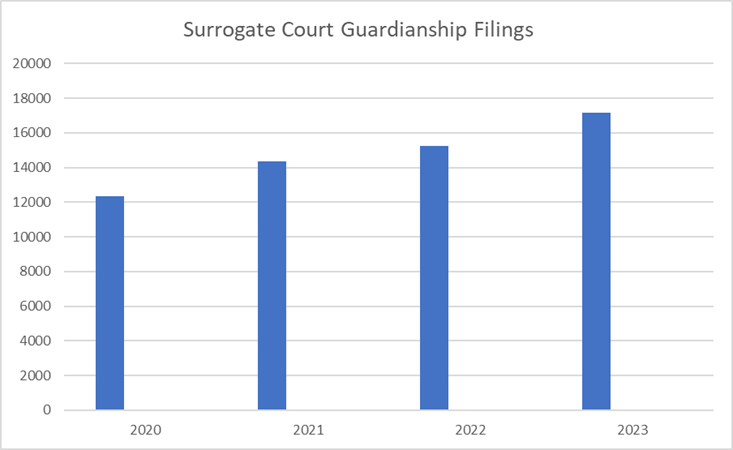According to multiple published reports, comedian Jay Leno is asking a California court to grant him authority over the financial affairs of his wife Mavis, who is apparently suffering from severe dementia. It’s heartbreaking to watch this couple, married for 43 years, endure a legal and emotional drama which, given their celebrity, is playing out in public. But it’s a story trust and estate attorneys see and hear day in and day out, albeit rarely with clients who make international news.
When people come to trust and estate or guardianship attorneys in these circumstances, our first sentiment is compassion. How could it be otherwise? These are inherently sad scenarios. But our second sentiment is a long, private sigh because, in New York, it could have all been avoided with careful planning. With a thorough Health Care Proxy and a very carefully crafted Durable Power of Attorney—not a generic power of attorney, but a durable power of attorney that survives incapacitation—New Yorkers can plan early and avoid the emotional and financial trauma that has seemingly befallen the Lenos.
Let’s consider some statistics.
According to the Centers for Disease Control and Prevention, the number of people living with Alzheimer’s Disease doubles every five years beyond age 65. What’s more, the National Institutes for Health reports that the prevalence of early onset dementia doubles every five years. It appears those numbers are reflected in guardianship filings in New York’s Supreme Courts. As the chart below shows, not only has the number of guardianship petitions in New York State increased almost 28 percent over the past four years, but the future trajectory is steadily trending upward.
Source: New York State Office of Court Administration
Mental Hygiene Law §81.01 (MHL §81.01), which we’ll examine more closely in a moment, reminds us that that “[t]he needs of persons with incapacitates are as diverse and complex as they are unique to the individual.” That’s a good starting point for proceeding under either Article 17-A of the Surrogate’s Court Procedure Act (SCPA 17-A), or the less restrictive MHL §81.01, both of which facilitate the appointment of guardians.
Article 17-A and Article 81 Guardianship
SPCA 17-A is a diagnosis-driven statute; the subject of the guardianship petition must have a particular diagnosis. It is most commonly used to provide for the long-term health care of individuals—often children—who were never competent to handle their own affairs and never will have that capacity. Most practitioners agree that SPCA 17-A strips the individual of many of their legal rights and their autonomy, imposing what one court described as an “extreme remedy” that should be employed rarely and cautiously. On the contrary, MHL §81.01 focuses on the functional ability of a person to carry out daily activities rather than the underlying cause. It is utilized for people like Mrs. Leno who, if media reports are accurate, is only gradually losing her competency to dementia.
In a New York §81.01, proceeding, Mr. Leno would have the burden to prove by “clear and convincing evidence” — more than just the “preponderance of evidence” as is usually required to prevail in a civil suit — that his wife needs a guardian to provide for her property management and personal needs, and that she either consents to his appointment or is found to be incapacitated. To grant the petition, the court would have to find that Mrs. Leno cannot appreciate the nature and consequences of her alleged inability to handle personal and/or financial matters and will likely suffer harm if a guardian is not appointed. Again, with §81.01, unlike SPCA 17-A, incapacity is a matter of functionality rather than diagnosis.
The Article 81 proceeding typically begins with an order to show cause, filed in Supreme Court in the county where the alleged incapacitated person (AIP) lives. The petition outlines why the AIP needs a guardian and either asks the court to appoint a specific individual (in the Leno matter, Jay) or another person who can be trusted to assume that role. Several interested parties—the AIP himself or herself, the spouse, children, parents, siblings, and possibly others—must be notified.
Appointing a Court Evaluator
The next step is the appointment by the court of a “court evaluator” to serve as the “eyes and ears” of the court. That person will visit the AIP and interview the proposed guardian and others who have pertinent information. The court may appoint counsel on its own initiative and must appoint if an attorney is requested by the AIP, if the AIP contests the proceeding, or if the individual is in need of major medical or dental treatment. Only after all those steps are completed is a hearing scheduled.
Rules for Guardianship Hearings
Unless the court finds that the alleged incapacitated person could not meaningfully participate, the hearing must be conducted in the presence of the AIP. Under the law, the judge is generally required to issue a decision within seven days of the hearing. If the court agrees that the individual is in need of a guardian, one is appointed. But it takes time since the guardian must undergo a court-approved training program, background check, and potentially be bonded.
Guardianship Requirements in New York
The guardian will be required to maintain financial records and file an initial accounting within 90 days of the appointment, as well as annually. Failure to keep sufficient records or report to the Court may result in the Guardian being removed. Usually, the guardianship will be maintained indefinitely and only terminate upon the death of the AIP; however, if the AIP’s condition improves, a proceeding may be commenced to terminate the guardianship earlier.
Complications in Guardianship
These proceedings start off complicated, and often get more complicated as issues particular to a specific case frequently arise. I had a case in the mid-1990s, Matter of Tara X (NYLJ, Sept. 18, 1996), in which I had to decide whether the court evaluator was entitled to review an alleged incapacitated person’s medical records when the AIP opposed the appointment of a guardian. Based on the evidence presented, I held in favor of the AIP and refused to grant the evaluator access to those records. Of course, when a novel issue arises, there is often an appeal, which results in additional legal proceedings, delays, and expenses. Matter of Tara X was not appealed, but the issue, legitimately raised, required research and the drafting of an opinion. That preparation obviously takes time.
Plan Early to Avoid a Guardianship Proceeding
If this all sounds like a lot of process, a lot of work, a lot of time, a lot of opportunity for things to go wrong, and a lot of money, it is. And that’s why it’s important to plan early and take the necessary steps to sidestep, if possible, a guardianship proceeding down the road. With a comprehensive Health Care Proxy and a Durable Power of Attorney, a guardianship proceeding can usually be avoided entirely.
I have no idea what sort of pre-planning the Lenos did or did not do, nor am I familiar with California law on these matters. What I do know is that in New York, with proper planning, a couple or family could almost certainly dodge the unpleasantness that Jay and Mavis Leno are experiencing right now.






